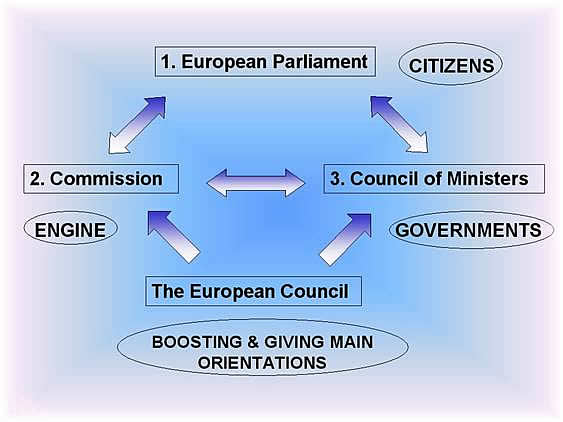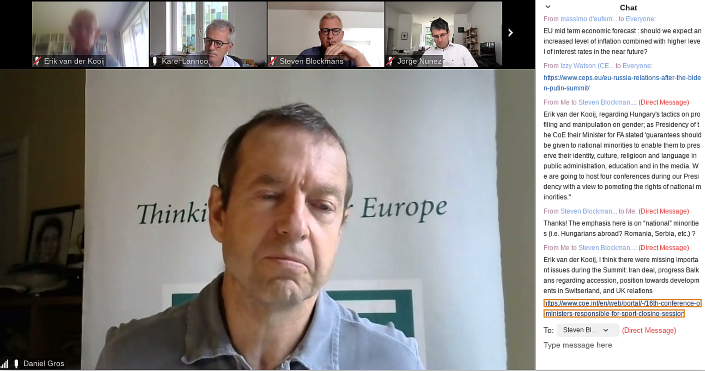(1) EU institution, where EU leaders meet around 4 times a year to discuss the EU’s political priorities. It passes EU laws, coordinates the broad economic policies of EU member countries, signs agreements between the EU and other countries, approves the annual EU budget, develops the EU's foreign and defence policies and coordinates cooperation between courts and police forces of member countries. The Council is an essential EU decision-maker. Acts which are directly relevant to the lives of EU citizens and have a considerable international impact are adopted by the Council, usually in conjunction with the European Parliament.
The Council is the EU institution where the Member States' government representatives sit, i.e. the ministers of each Member State with responsibility for a given area. The composition and frequency of Council meetings vary depending on the issues dealt with. Foreign ministers, for example, meet roughly once a month in the Foreign Affairs Council. Similarly, economics and finance ministers meet once a month in the Council which handles economic and financial affairs, called the Ecofin Council. There are ten Council configuration, covering the whole range of EU policies. The General Affairs Council, which is usually attended by foreign ministers or European affairs ministers, makes sure that the various Council configurations are working consistently with one another and makes the preparations for European Council meetings.The Council's remit:
-
It adopts legislative acts (Regulations, Directives, etc.), in many cases in "co-decision" with the European Parliament;
-
It helps coordinate Member States' policies, for example, in the economic field;
-
It develops the common foreign and security policy, on the basis of strategic guidelines set by the European Council;
-
It concludes international agreements on behalf of the Union;
- It adopts the Union's budget, together with the European Parliament.
The Council as law-maker:
The EU's laws are made by the Council, together with the European Parliament. In most cases, the Council can only legislate on the basis of proposals submitted to it by the European Commission. It can ask the Commission to submit any proposals it may deem appropriate. Since the entry into force of the Treaty of Lisbon, a million citizens may also sign a petition inviting the Commission to submit a proposal. This is the citizens' right of initiative. The Council sits in public when it is discussing and voting on a proposal for a legislative act or when there is a general debate. You can follow these discussions in real time on the Council's Internet site (video.consilium.europa.eu) and see, for example, how your minister is putting your country's point of view. The written documentation available to the ministers is also accessible to everyone. Conversely, discussions on matters which do not involve legislation, for example foreign affairs, are not public.
However, Council meetings are always followed by a press conference and a press release explaining what decisions have been taken.
A qualified majority will be reached if the following two conditions are met:
-
if a majority of Member States approve (in some cases a two-thirds majority);
- a minimum of 260 votes is cast in favour of the proposal, out of a total of 352 votes.
In addition, a Member State may ask for confirmation that the votes in favour represent at least 62 % of the total population of the Union. If this is found not to be the case, the decision will not be adopted.
Distribution of votes for each Member State |
Germany, France, Italy, United Kingdom |
29 |
Spain, Poland |
27 |
Romania |
14 |
Netherlands |
13 |
Belgium, Czech Republic, Greece, Hungary, Portugal |
12 |
Austria, Bulgaria, Sweden |
10 |
Croatia, Denmark, Finland, Ireland, Lithuania, Slovakia |
7 |
Cyprus, Estonia, Latvia, Luxembourg, Slovenia |
4 |
Malta |
3 |
TOTAL |
352 |
The Presidency of the Council:
The EU's 27 Member States take it in turn to chair the Council for a period of six months each. During this six-month period, the Presidency chairs meetings at every level, proposes guidelines and draws up the compromises needed for the Council to take decisions. In the interests of continuity of Council business, the six-monthly presidencies work together closely in groups of three. These three-Presidency teams draw up a joint programme of Council work over an 18-month period. Only one Council configuration is not chaired by the six-monthly presidency: the Foreign Affairs Council, which, since the entry into force of the Treaty of Lisbon, has been chaired by the High Representative of the Union for Foreign Affairs and Security Policy. Since 1 December 2009 this post has been held by Ms Catherine Ashton. Roughly twenty working parties in the foreign affairs field also have a permanent chairman appointed by the High Representative |


